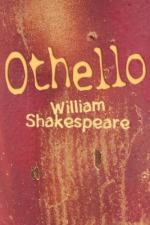|
This section contains 8,264 words (approx. 28 pages at 300 words per page) |

|
SOURCE: Buchman, Lorne M. “Orson Welles's Othello: A Study of Time in Shakespeare's Tragedy.” Shakespeare Survey 39, (1987): 53-65.
In the following essay, Buchman contrasts Iago's view of time as changeable with Othello's perception of time as an eternal, orderly continuum, and remarks that the Moor's underlying fear of time's power to destroy love and honor makes him particularly vulnerable to Iago's treachery. Buchman also demonstrates how Orson Welles, in his film adaptation of Othello, used various cinematic techniques to underscore the significance of time in the play.
With the recent wave of scholarship on Shakespeare on film there is at least one important line of questioning still to pursue: can the film medium serve as a critical tool for interpreting or reinterpreting Shakespeare's work?1 Is there something to learn, to rediscover, to see in a new light when, to borrow Walter Benjamin's phrase, we have ‘the ingenious guidance of...
|
This section contains 8,264 words (approx. 28 pages at 300 words per page) |

|


